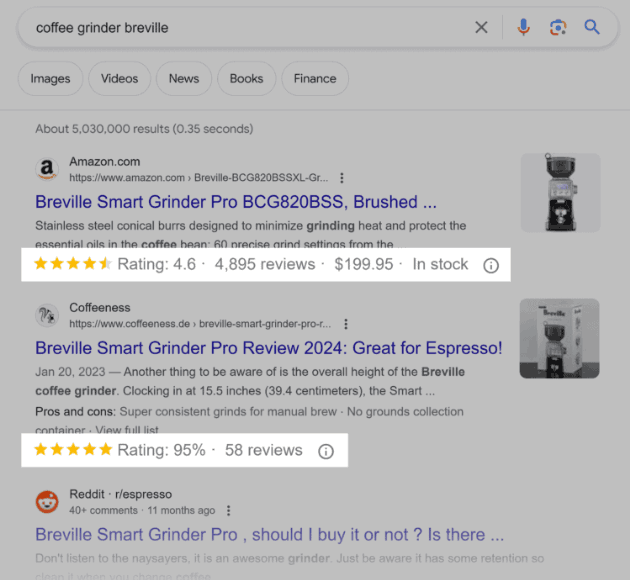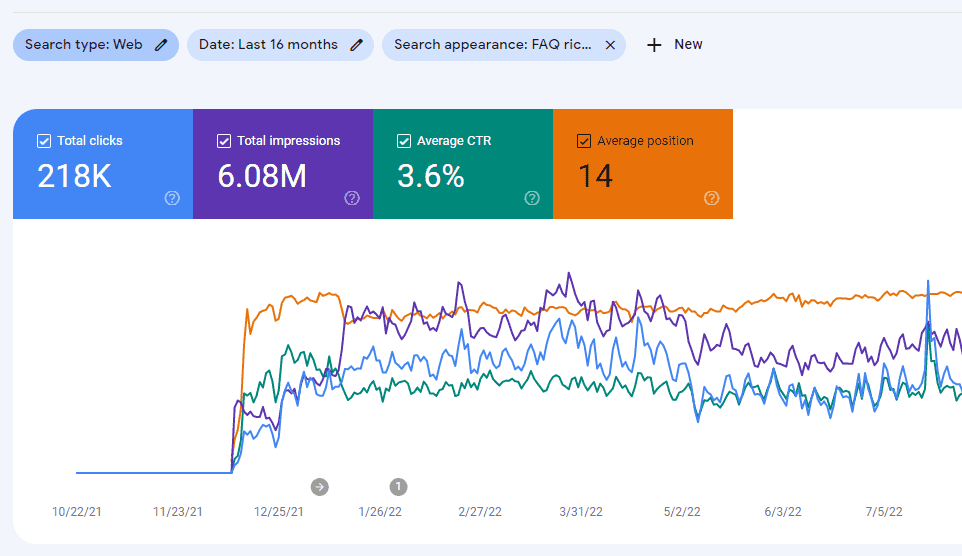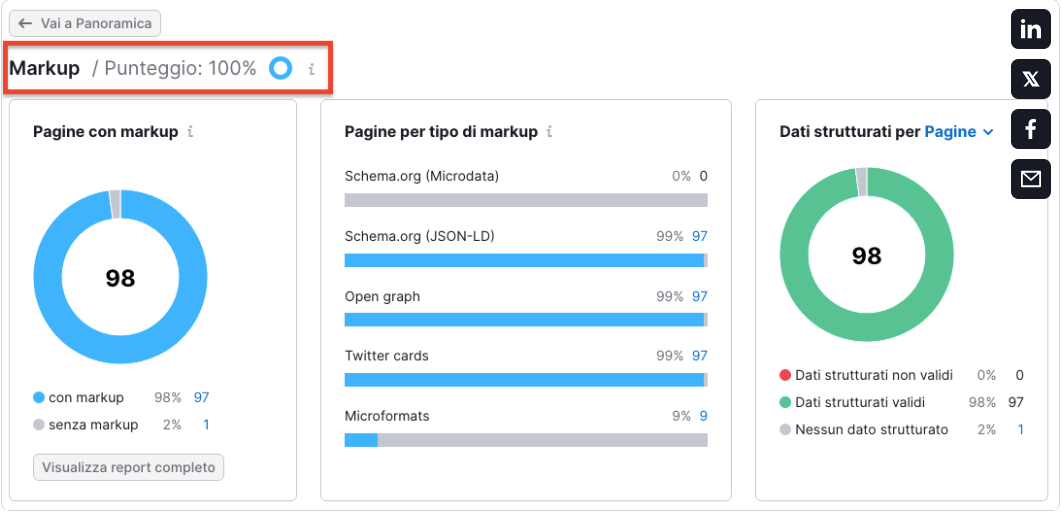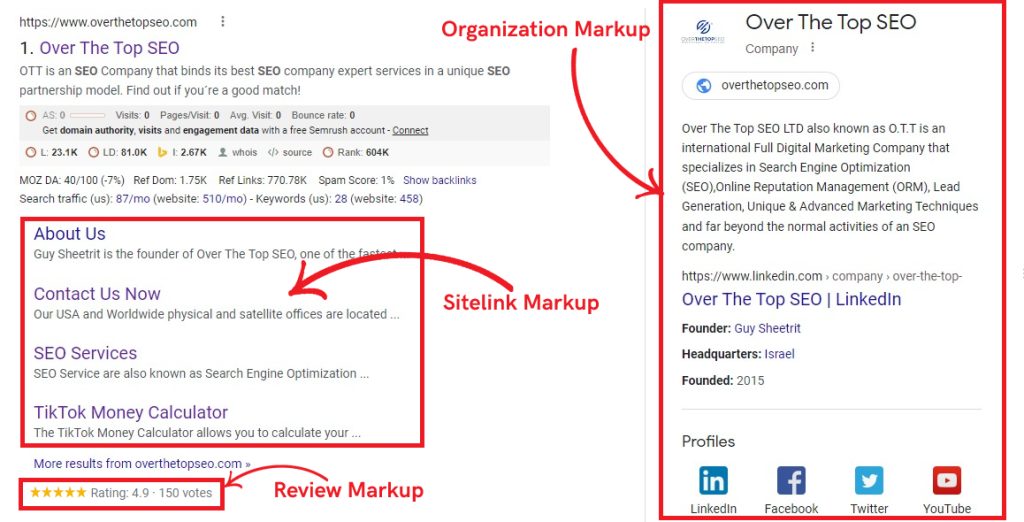Organic CTR has become less predictable since AI Overviews appeared, with some industries seeing 20–30% drops. That shift is exactly why understanding how schema affects rankings in 2026 matters for B2B teams competing in crowded SERPs.
Schema markup adds structured data that helps Google clearly interpret what your page represents. It increases eligibility for rich results and can improve click-through rate when implemented properly.
In this article, we break down 5 strategic benefits, 10 high-impact schema types, and the practical limitations you need to understand how schema affects rankings in real-world B2B SEO.
Key Takeaways
|

What is Schema Markup and Why Is It Important for SEO?
Schema Markup is a form of structured data vocabulary. It’s a semantic code that’s added to HTML, helping search engines understand the content on pages. When search engines understand content more clearly, they can show richer, more informative results. Schema markup code enhances a website’s SEO performance.

Schema markup code enhances a website’s SEO performance
Without a Schema, search engines read the text but might not fully grasp the context. With Schema Markup, you explicitly tell them, “This is a product, its price is X, and it has Y reviews.” Clear communication is vital for SEO because it helps your website appear more relevant to specific searches.
According to Milestone Research, websites that implement schema see up to 58% higher click-through rates and double the visibility compared to those that don’t. Yet, despite these benefits, over 60% of websites still fail to use schema correctly or at all.
In 2026, this matters even more because AI Overviews and entity-first indexing are reshaping how results are displayed. Rich snippets are no longer guaranteed visibility advantages, and Google has tightened FAQ eligibility while cracking down on structured data abuse.
Is Schema Markup a Direct Ranking Factor?

Schema Markup indirectly influences search rankings
Google has stated that Schema Markup is not a direct ranking factor. This means simply adding Schema to your site will not automatically move your website higher in search results. Google does not give a “ranking boost” just because you have Schema.
However, Schema Markup does have indirect effects on rankings. It helps search engines understand your content better. When Google understands your content, it can display your website in more appealing ways in search results. This can then indirectly influence your rankings.
How Schema Affects Rankings in 2025? 4 Major Benefits
Enhanced Visibility with Rich Results
Schema Markup helps your website appear with “rich results” or “rich snippets” in search engine results pages (SERPs). While standard listings only show a title, URL, and brief description, rich results include additional details like star ratings, prices, images, or event dates directly in the search results.
Popular rich snippet types include:
- Review Snippets: Show star ratings and number of reviews for products, services, or recipes.
- Product Snippets: Display price, availability, and review ratings for e-commerce products.
- FAQ Snippets: Present a list of questions and answers directly below the main search result.
- Event Snippets: Show dates, times, and locations for upcoming events.
- Recipe Snippets: Include cooking times, ingredients, and review ratings for recipes.
- HowTo Snippets: Provide steps for a process directly in the SERP.
Increased Click-Through Rate (CTR)

A graph showing higher CTR with schema-enhanced search results
Even if your website is not in the top position, a rich snippet can attract more clicks than a standard listing above it. They take up more space on the SERP and provide more information at a glance. This visual prominence and extra detail make users more likely to click on your listing.
Data from various studies shows that implementing schema markup can significantly improve CTR. For instance, a case study by SearchPilot showed that adding HowTo Schema led to a 60% increase in organic clicks for those pages. Another study found that sites with snippets often see CTRs that are 2-3 times higher than those without.
Boosting Organic Traffic & On-Page Time
Schema Markup helps Google better understand the context and specific details of content. When users find exactly what they are looking for directly from the search results, they are more likely to be satisfied with your page. This leads to higher quality organic traffic.
Higher quality traffic means users increased “on-page time” or “dwell time”, which sends a positive signal to Google. Google uses these engagement signals (like on-page time and bounce rate) as indirect ranking factors. So, schema indirectly helps your content rank better by driving more qualified traffic that stays longer.
Opportunities for Special SERP Features

Rich results displaying review stars and product details on Google
Schema Markup also helps your brand appear in other prominent SERP features, increasing visibility. Using JSON-LD can improve rankings and unlock these opportunities. Key SERP features influenced by Schema include:
-
Knowledge Graph: A box that appears on the right of search results for brands, people, or places. Organization and Person Schema can help your brand gain visibility and authority.
-
Featured Snippets (“Position Zero”): Concise answers displayed at the top of search results. Well-structured content with schema can increase eligibility for these spots.
-
People Also Ask (PAA) boxes: Related questions with expandable answers. Using FAQ schema helps your content appear in these sections, capturing more visibility.
-
Carousels: Horizontal lists of related items. Schema types like RecipeList or Course can help your content show up in these engaging carousels.
Strengthening Entity Signals in an AI-First SERP
In 2026, Google relies heavily on entity understanding rather than just keyword matching. Schema helps connect your content to defined entities such as your brand, services, authors, and products within Google’s Knowledge Graph.
This improves contextual clarity across your entire domain.
As AI Overviews and generative answers pull structured signals to summarize content, schema increases the likelihood that your brand, service descriptions, or FAQs are accurately interpreted. It does not guarantee placement, but it reduces ambiguity.
In competitive B2B markets, reduced ambiguity often translates into stronger topical authority over time.
Top 10 Most Effective Schema Types & How To Use Them
Choosing the right schema types that support structured data SEO is key to improving how schema affects rankings. Below are 10 effective schema types with concise implementation tips to maximize SEO impact in 2025:
- Article Schema
- Product Schema
- Review Schema Markup
- Organization Schema
- Local Business Schema Markup
- Breadcrumb Schema Markup
- Event Schema Markup
- Recipe Schema Markup
- Video Schema
- Schema Enhancements
1. Article Schema

Article Schema helps Google index content accurately
Use Article Schema to give Google more context about your blog posts, news articles, or editorial content. It allows search engines to display elements like the author’s name, published date, and headline directly in search results. These rich snippets help establish trust and relevance to users.
2. Product Schema
This schema is ideal for e-commerce websites that want their products to stand out in search listings. Product Schema enables you to display price, availability, images, and user ratings directly in SERPs. These visual cues capture attention and offer key purchase info upfront.
3. Review Schema Markup
Review Schema lets you show average star ratings and user-generated feedback below your listing. These visual ratings help increase trust and offer social proof to potential customers. As users prefer content with reviews, CTR and trust can grow significantly.
4. Organization Schema

Organization Schema strengthens brand presence in Google’s Knowledge Graph
You can use the Organization Schema to tell search engines about your brand’s official information. It highlights details like logo, contact page, headquarters, and social profiles in a structured form. This supports your presence in Google’s Knowledge Graph and builds brand credibility.
5. Local Business Schema Markup
Local Business Schema is essential for any company that operates from a physical location. It includes critical data such as business hours, address, phone number, and services offered. This schema improves visibility in Google Maps and the local pack results. More accurate listings lead to higher foot traffic and better engagement.
Interested in improving your local SEO? Check our article: Why Local SEO Is Important to Your Business in 2025 and Beyond?
6. Breadcrumb Schema Markup
Breadcrumb markup shows the navigational path of your web pages in search results. It helps users understand your site’s hierarchy, reducing confusion and improving click quality. Implementing this schema also contributes to a cleaner and more organized SERP appearance.
7. Event Schema Markup

Event schema increases visibility for event-related searches
Event Schema helps promote events like conferences, webinars, and concerts directly within Google results. It displays event dates, times, locations, and ticket information in a structured format. These enhanced listings make it easier for users to find and attend your events.
8. Recipe Schema Markup
Recipe Schema enhances how your cooking content appears in search, especially on mobile devices. It displays details such as ingredients, cook time, calories, and preparation steps. This makes your recipe listings far more engaging and useful to users. As a result, the site can attract more qualified traffic and better user interaction.
9. Video Schema
Video Schema helps search engines better understand your video content by tagging elements like duration, description, and thumbnail. This markup enables rich features like video previews in Google Search or even Google Discover. Videos with schema tend to get more visibility and engagement.
10. Schema Enhancements
Go beyond basic implementation by optimizing your existing schema with additional properties. Include optional fields or extend markup to new content types like podcasts, FAQs, or tutorials. Conduct A/B tests to see which enhancements deliver better results in search, then scale successful enhancements site-wide.
Actual Case Studies About Applying Schema That Increase Ranking
Curious about how schema markup translates into real-world SEO results? Let’s dive into these concise insights from SearchPilot’s recent studies (2025), highlighting the schema’s impact on website visibility and organic traffic.
- Switching from Microdata to JSON-LD: A retail site tested converting microdata (breadcrumb, review, offer schemas) to JSON-LD. The goal was to boost organic traffic. Results showed no notable traffic increase, suggesting microdata can still be effective.
- Adding a Question to the FAQ Schema: An e-commerce site added a question to its FAQ content and updated the schema. This led to a 9% rise in organic traffic due to enhanced FAQ rich results. It improved CTR and brand query rankings.
- Adding dateModified Schema: A business added a dateModified schema to store landing pages to signal freshness. The test showed no clear traffic boost, indicating limited impact on rankings without broader optimizations.
These cases demonstrate the schema markup and search engine ranking benefits when strategically applied. Testing ensures effective schema use for SEO.
What Is The Future Trends of Schema?

Google may introduce schemas for AI-generated content or virtual events
As Google evolves its algorithms and introduces new search features, how schema affects rankings will depend on leveraging emerging trends. Below are the key future trends shaping schema’s role in SEO:
- New schema types: Google may introduce schemas for AI-driven content or virtual events. Businesses should monitor Schema.org for updates to adopt these schemas early. Early adoption can secure a first-mover advantage in niche search results, boosting how schema affects rankings.
- Voice Search: With 30% of searches now voice-based (Forbes, 2025), schema markup will optimize content for voice assistants like Google Assistant. This markup identifies key sections of content for spoken responses, improving visibility in voice search results.
- Algorithm Updates: Google’s algorithms increasingly prioritize user intent. Schema helps by structuring data to match search intent, such as marking up FAQs for informational queries.
- SERP Features: Schema will power more interactive results, like 3D product previews, interactive FAQs, or augmented reality results. These features enhance user engagement, indirectly improving how schema affects rankings by increasing click-through rates.
- Cross-Platform Compatibility: Schema will increasingly support cross-platform experiences, such as integrating with apps, wearables, or IoT devices. Businesses should test schemas for compatibility with emerging platforms to stay ahead. This aligns with the benefits of using schema for SEO.
Conclusion
Schema will not magically move you up the rankings, but understanding how schema affects rankings helps you compete in an AI-driven, entity-first search landscape. When structured data reinforces entity clarity, supports rich result eligibility, and aligns with real search intent, it becomes a crucial strategic advantage.
At Golden Owl Digital, we usually start by evaluating whether schema is implemented for decoration or for strategy. If you want a clear view of where structured data fits into your broader SEO performance, we’re happy to take a closer look and help you prioritize what actually helps your business.

Jaden is an SEO Specialist at Golden Owl Digital. He helps brands rank higher with technical SEO and content that resonates






